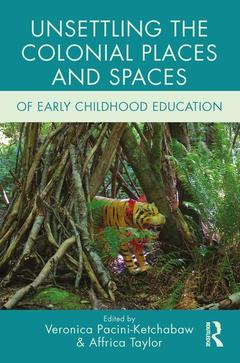Description
Unsettling the Colonial Places and Spaces of Early Childhood Education
Changing Images of Early Childhood Series
Coordinators: Pacini-Ketchabaw Veronica, Taylor Affrica
Language: English
Subject for Unsettling the Colonial Places and Spaces of Early...:
Keywords
Early Childhood Curriculum Development; Common World Pedagogies; Postcolonial Tensions in Early Childhood; Early Childhood Student Teachers; Veronica Pacini-Ketchabaw; Canadian Settler Colonialism; Affrica Taylor; Remote Aboriginal People; Changing Images of Childhood; Early Childhood Educators; Nicola Yelland; Inuit Nunangat; colonialist tensions; Torres Strait Islander; early childhood education; Frankston North; epistemological spaces; Settler Colonial Societies; material places; Remote Aboriginal Communities; immigrant settler societies; Early Childhood Services; neocolonialism; Torres Strait Islander Perspectives; neoliberalism; ITK; racialization; Early Childhood Workforce; indigenous; nonAboriginal People; non-indigenous; Batchelor Institute; postcolonial theory; Inuit Knowledge; indigenous onto-epistemology; Inuit Languages; White Law; Aboriginal Early Childhood; Inuvialuit Settlement Region; non-Aboriginal People; Early Childhood Training; Education Review Office
Publication date: 09-2016
· 15.2x22.9 cm · Paperback
Publication date: 03-2015
· 15.2x22.9 cm · Hardback
Description
/li>Contents
/li>Biography
/li>
Unsettling the Colonial Places and Spaces of Early Childhood Education uncovers and interrogates some of the inherent colonialist tensions that are rarely acknowledged and often unwittingly rehearsed within contemporary early childhood education. Through building upon the prior postcolonial interventions of prominent early childhood scholars, Unsettling the Colonial Places and Spaces of Early Childhood Education reveals how early childhood education is implicated in the colonialist project of predominantly immigrant (post)colonial settler societies. By politicizing the silences around these specifically settler colonialist tensions, it seeks to further unsettle the innocence presumptions of early childhood education and to offer some decolonizing strategies for early childhood practitioners and scholars. Grounding their inquiries in early childhood education, the authors variously engage with postcolonial theory, place theory, feminist philosophy, the ecological humanities and indigenous onto-epistemologies.
Series Editor Introduction
Introduction: Unsettling the Colonial Places and Spaces of Early Childhood Education in Settler Colonial Societies
Affrica Taylor, University of Canberra
Veronica Pacini-Ketchabaw, University of Victoria
Section 1 - Unsettling Places
Chapter 1: Forest Stories: Restorying Encounters with ‘Natural’ Places in Early Childhood Education
Fikile Nxumalo, University of Victoria
Chapter 2: Unsettling pedagogies through common world encounters: Grappling with (post)colonial legacies in Canadian forests and Australian bushlands
Veronica Pacini-Ketchabaw, University of Victoria
Affrica Taylor, University of Canberra
Chapter 3: The fence as technology of (post)colonial childhood in contemporary Australian Kerith Power, University of Western Sydney
Margaret Somerville, University of Western Sydney
Section 2 - Unsettling Spaces
Chapter 4: Troubling Settlerness in Early Childhood Curriculum Development
Emily Ashton, University of Victoria
Chapter 5: Te Whāriki in Aotearoa New Zealand: Witnessing and Resisting Neoliberal and
Neo-colonial Discourses in Early Childhood Education
Marek Tesar, University of Auckland
Chapter 6: Mapping Settler Colonialism and Early Childhood Art
Vanessa Clark, University of Victoria
Chapter 7: Teaching in the Borderlands: Stories from Texas
Julia C. Persky, Texas A&M University
Radhika Viruru, Texas A&M University
Section 3 - Unsettling Indigenous- Non-Indigenous Relations
Chapter 8: Dis-entangling? Re-entanglement? Tackling the pervasiveness of colonialism in early childhood (teacher) education in Aotearoa
Jenny Ritchie, Victoria University of Wellington
Chapter 9: Unsettling both-ways approaches to learning in remote Australian Aboriginal early childhood workforce training
Lyn Fasoli, Bachelor Institute of Indigenous Tertiary Education
Rebekah Farmer, Batchelor Institute of Indigenous Tertiary Education
Chapter 10: Unsettling Yarns: Reinscribing Indigenous architectures, contemporary Dreamings and newcomer belongings on Ngunnawal country, Australia
Adam Duncan, Wiradjuri Early Childhood Centre, University of Canberra
Fran Dawning, ACT Education and Training Directorate
Affrica Taylor, University of Canberra
Chapter 11: Thinking with land, water, ice, and snow: A proposal for Inuit Nunangat pedagogy in the Canadian Arctic
Mary Caroline Rowan, University of New Brunswick
Notes on the Contributors
Index
Veronica Pacini-Ketchabaw is Professor and Coordinator of the Early Years Specialization in the School of Child and Youth Care at the University of Victoria, Canada.
Affrica Taylor is Associate Professor in Childhood Geographies and Education at the University of Canberra, Australia.

